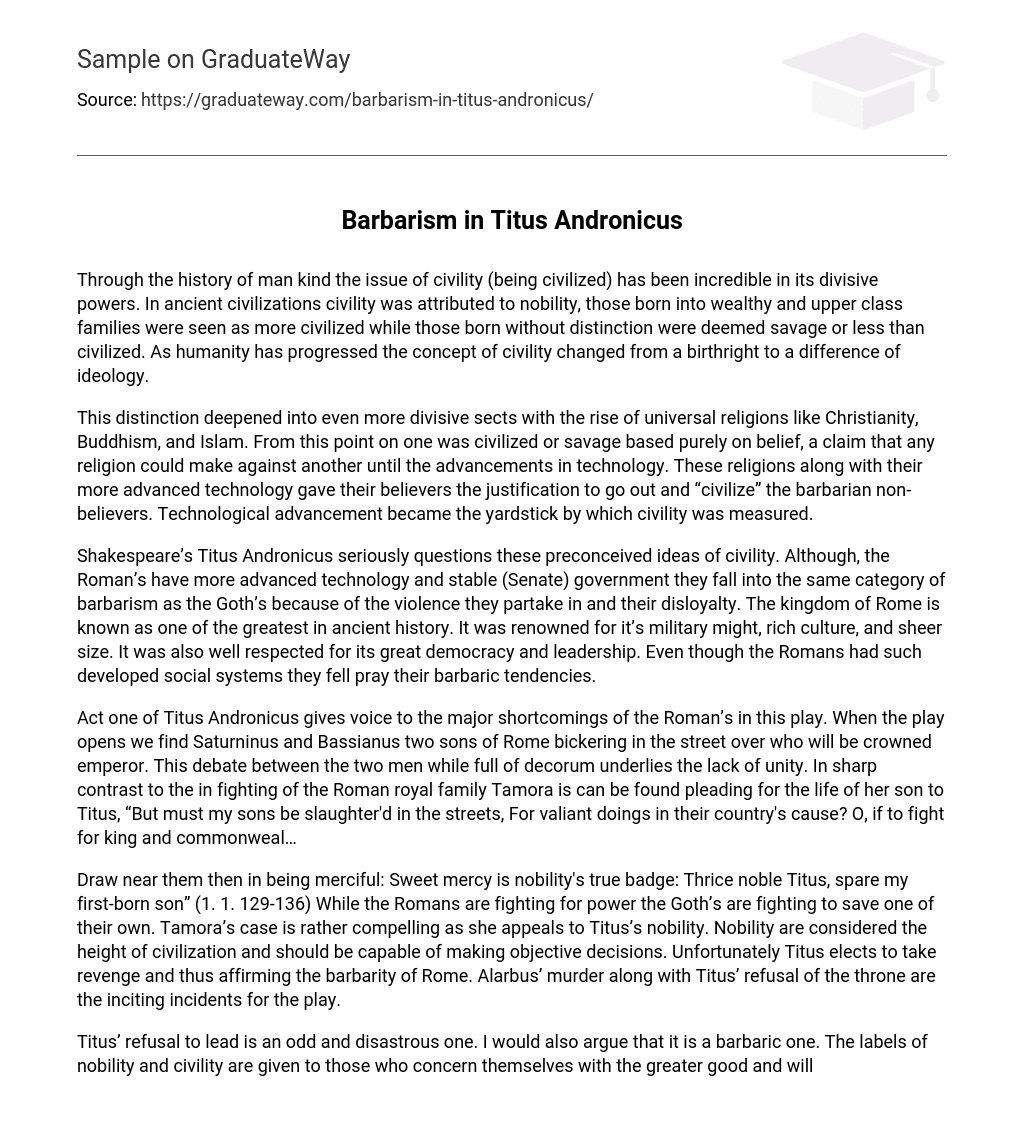Throughout human history, the concept of civility has been highly influential and has caused division. In ancient societies, being seen as civilized was associated with belonging to the nobility or upper class. Those who were born into wealthy families were considered more civilized, whereas those without privilege were deemed savage or less civilized. However, as civilization has advanced, the notion of civility has evolved to encompass differences in ideology rather than solely being determined by birthright.
The division deepened as universal religions such as Christianity, Buddhism, and Islam emerged, leading to even more conflicting factions. Henceforth, civilization or savagery was determined solely by one’s beliefs, with each religion making claims against the others until advancements in technology. These religions, coupled with their more sophisticated technology, provided justification for their followers to “civilize” the non-believing barbarians. Technological progress became the benchmark for measuring civilization.
In Shakespeare’s Titus Andronicus, the text challenges the conventional notions of civility. Despite possessing more advanced technology and a stable government in the form of the Senate, the Romans are placed in the same category of brutality as the Goths due to their participation in violence and disloyalty. Rome, known as one of the most prominent kingdoms in ancient history, was celebrated for its military prowess, vibrant culture, immense size, and exceptional democracy and leadership. However, despite their advanced societal structures, the Romans succumbed to their savage inclinations.
The first act of Titus Andronicus showcases the major flaws of the Romans in this play. As the play begins, we witness Saturninus and Bassianus, two sons of Rome, engaging in a quarrel on the street about who will become the emperor. This argument between the two men, although seemingly polite, reveals the lack of unity among them. In stark contrast to the internal conflicts within the Roman royal family, Tamora can be seen imploring Titus to spare her son’s life, saying, “But must my sons be slaughter’d in the streets, For valiant doings in their country’s cause? O, if to fight for king and commonweal…”
While the Romans are engaged in power struggles, the Goths are fighting to protect their own. Tamora presents a convincing argument to Titus, appealing to his nobility: “Draw near them then in being merciful: Sweet mercy is nobility’s true badge: Thrice noble Titus, spare my first-born son” (1. 1. 129-136). Nobility, seen as the pinnacle of civilization, should be capable of making impartial decisions. However, Titus chooses revenge, reinforcing Rome’s savagery. The murder of Alarbus and Titus’ refusal of the throne are the catalysts for the events that unfold in the play.
Titus’ decision not to take the lead is both strange and disastrous. I believe it is also barbaric. The titles of nobility and civility are bestowed upon those who prioritize the common good and are willing to make sacrifices. Although Titus’ choice was meant to show humility, it ultimately led to significant loss. Additionally, the Romans’ treatment of women is another example of their barbaric nature. The supposedly superior Gothic culture treats women in the same way. The character Lavinia exemplifies this identical treatment.
The brutality of the Goths’ rape and dismemberment of Lavinia is reflected in Titus’s decision to kill her. Despite the pain and sadness, his resolution is to end her life. It is hard to determine which act is more heinous – murdering his own daughter or raping and dismembering a woman, regardless of the motives. The conduct of Roman barbarity is further demonstrated in how Saturninus and Bassianus handle women. Saturninus’ desire to marry Lavinia solely to spite his brother is immature and falls below the expected behavior of an emperor.
Similarly, the decision to make Tamora his queen can also be interpreted as uncivilized or barbaric. In terms of sexuality, it appears that the Romans struggle to control their desires just like the Goths. They display the same misogynistic treatment towards women. The ultimate showcase of Rome’s barbarism is its involvement in violent acts. Undoubtedly, the most brutal actions in the play involve the rape and dismemberment of Lavinia. However, a very close second is the way Romans treat Tamora’s sons.
Titus Andronicus resorts to cannibalism as a means of avenging the murder of his sons and the loss of his hand, which is considered the pinnacle of barbarity. This act of making a stew out of human bodies represents a significant departure from any concept of civility, highlighting the play’s symbolic portrayal of the savagery inherent in human nature. The desire for revenge evident throughout human history aligns with the notion of humans being as uncivilized as animals, transcending technological advancements or cultural traditions. Thus, both the Romans and the Goths are depicted as barbarians.
Despite our technological and intellectual advancements, the play “Titus Andronicus” presents a bleak critique of contemporary culture, shedding light on the issue of censorship and what is deemed suitable for public display. It offers a frank portrayal of humanity that contrasts with our current self-perception. Despite being accustomed to violence in our daily entertainment, we tend to dissociate it from our inherent nature. However, “Titus Andronicus” reminds us that beneath our progress lies an undeniable savage aspect of human nature that cannot be disregarded.





